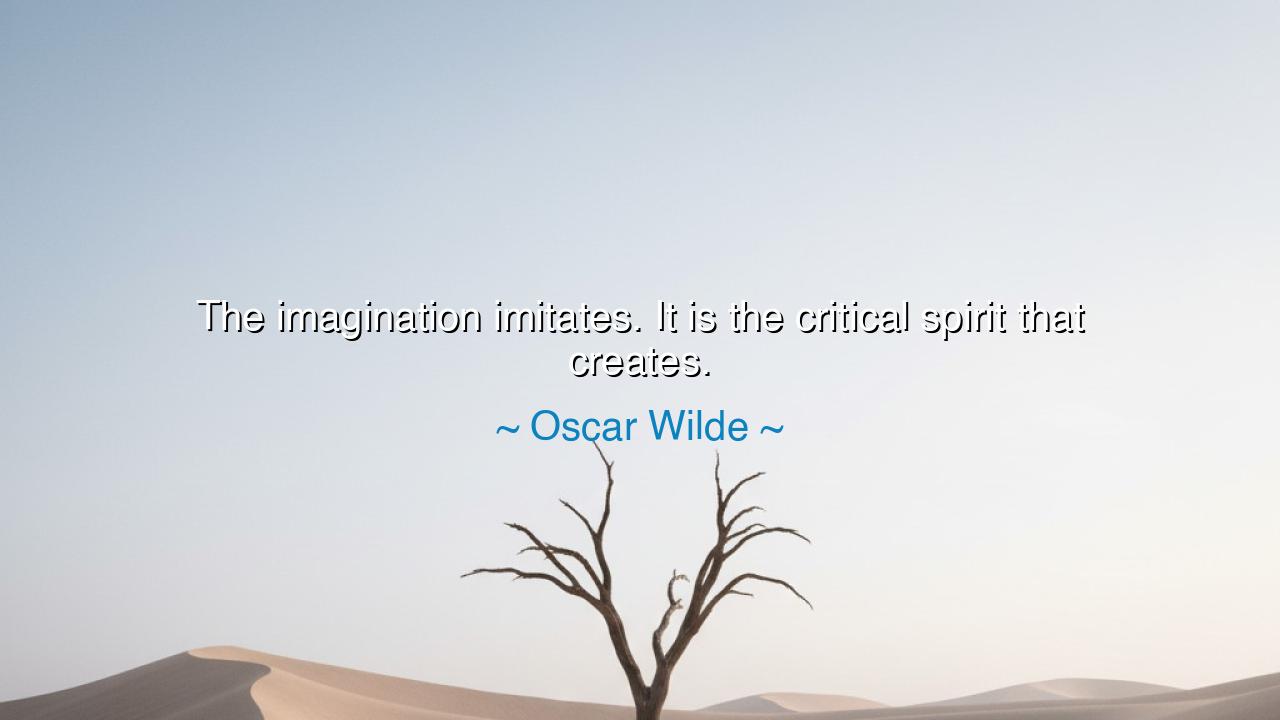
The imagination imitates. It is the critical spirit that creates.






“The imagination imitates. It is the critical spirit that creates.” Thus declared Oscar Wilde, the poet of paradox and prophet of beauty, who understood that true creation is not born from fancy alone, but from the fire of discernment — from the critical spirit that questions, refines, and transforms. His words are not an insult to imagination, but a revelation of its limits. For though the imagination is the mother of dreams, it often borrows from what it knows, reshaping the familiar into visions of delight. Yet the critical spirit — that divine restlessness of mind which seeks truth beyond illusion — is the father of originality. Together, they form the eternal marriage of art and wisdom.
In Wilde’s age, as in ours, the imagination was celebrated as the highest faculty of the artist. Yet Wilde, ever the contrarian sage, saw deeper. He knew that to imagine is to gather — to absorb the world’s images, its beauties and sorrows, and rearrange them. But to create, truly and enduringly, one must go beyond imitation. The critical spirit is what pierces through the veil of appearances; it dares to judge what should remain and what must be remade. The artist who only imagines reflects life, but the artist who also questions it reshapes the soul of humanity.
Consider Socrates, the philosopher of Athens, whose gift was not invention but inquiry. He built no temples, composed no poems, painted no scenes — yet through his relentless criticism of falsehood and complacency, he birthed a revolution of thought. His questions tore down ignorance and compelled others to see truth afresh. He was, as Wilde would say, a creator not through imagination, but through the critical spirit, for he taught the world to think, and in doing so, changed the course of civilization.
So too in the world of art, Michelangelo gazed upon a block of marble and did not merely imagine beauty within it — he criticized the stone. He removed what was unnecessary, what was unworthy of the vision within. “I saw the angel in the marble,” he said, “and carved until I set him free.” His imagination revealed the angel, but it was his critical spirit — his power to discern what must be cut away — that created the masterpiece. Wilde’s wisdom lives in such acts: creation is the triumph of disciplined vision over unshaped dreaming.
The imagination is a wondrous gift, but left alone, it can become a mimic, a mirror that dazzles without depth. It may copy the rhythms of others, echo the voices of the past, or lose itself in fantasy without form. The critical spirit, however, grounds imagination in truth and purpose. It asks, “Why does this matter? What must be said that has not yet been spoken?” It is the questioning flame that turns imitation into revelation. Without criticism, imagination remains a cloud — luminous, yet fleeting. With it, the cloud becomes thunder, and thunder shakes the world.
Wilde himself lived this paradox. His works — The Picture of Dorian Gray, The Importance of Being Earnest — are filled with beauty and wit, but beneath the shimmer lies judgment: a critique of hypocrisy, vanity, and moral blindness. He used imagination to enchant, and the critical spirit to awaken. Through satire and symbolism, he revealed society to itself, holding up a mirror so sharp it cut. Thus he proved that true creation is not the escape from truth, but its transfiguration.
Let this then be the lesson: Imagination begins the journey, but the critical spirit completes it. To dream is noble, but to question your dream is divine. Do not be content to imitate what is beautiful; seek to understand why it is so, and how it might be made better. In art, in thought, in life — cultivate not only the capacity to envision, but the courage to examine. The mind that both dreams and doubts is the mind that builds worlds that endure.
So, O seeker of wisdom, honor your imagination, but worship your discernment. Play, but also question. Admire, but also refine. For it is not the imitator who changes the world, but the creator — the one whose critical spirit dares to carve truth from illusion, and from the dust of what is, gives birth to what must be.






AAdministratorAdministrator
Welcome, honored guests. Please leave a comment, we will respond soon